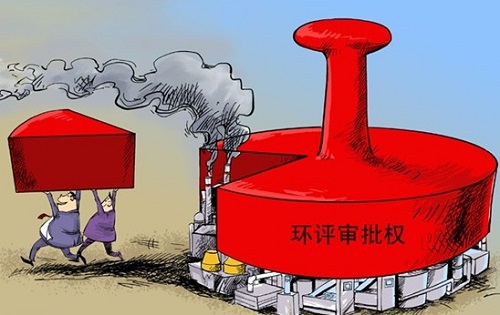A decision by the Ministry of Environmental Protection last march to allow local governments more power in approving new power plant proposals appears to be all but backfiring.
去年3月,环保部权力下方,将建设项目审批权下放至各地政府,但却适得其反。
Originally intended to enhance administrative efficiency, the decision has led to the approval of a slew of new power projects in direct contradiction of the government’s environmental agenda.
原想提高行政效率,没成想却批复了大量新建设项目,显然与政府的环保计划背道而驰。
In the northern province of Shanxi alone, 23 coal-fired power plants won approval from March to October last year.
从去年3月到10月,仅山西就批复了23个新项目。
Two of them, proposed by China Coal Pingshuo Group and China Resources Power Holdings, were previously shot down by the ministry due to concerns about air pollution.
这其中就包括中煤平朔、华润电力低热值煤项目,这两个项目曾因空气污染遭环保部否决。
Three other such projects were also approved in Inner Mongolia.
3个内蒙古项目也通过环评。
Coal-rich provinces like Shanxi have actively promoted plants that use waste materials from coal-mining to generate electricity in order to boost economic growth in the past.
以前,煤炭大省山西曾利用煤炭废料发电,促进经济增长。
And given that these regions have been on the blunt end of the national economic slowdown, temptations to allow such operations would have been irresistible.
随着经济放缓,采用废料发电已势不可挡。

Indeed, it is worth noting that economic growth has been a major determinant of provincial officials’ prospect for promotion.
值得注意的是,地区经济增长对地方官员晋升有着决定性作用。
But the key problem here is the usage of waste materials from coalmines, which include gangue, slime and middling.
但主要问题出在了煤矿废料发电,煤炭中包含了大量脉石、烂泥以及中矿。
China produces some 300 million tons of them, but only a third of it goes to power facilities.
中国每年会产生约3亿吨煤炭废料,但只有三分之一用于能源。
The rest are left unused, sprawling over some 13,000 hectares of land. And in their idle state, they not only create harmful gases but also pollute nearby soil and water.
其余搁置不用,约1.3万公顷土地遭污染。这些废料不仅会产生有害气体,还会污染附近土壤水源。
However, using them to produce power generates greater amounts of dust and sulphur dioxide emissions than using materials with higher quality.
较使用环保材料,废料发电会产生更多灰尘,更多二氧化硫。
And central authorities say this is something that the smog-choked skies of Northern China cannot afford to take on.
但据中央政府表示,北方的污染天气不适宜采用废料发电。
Such dilemma has been at the bottom of a vacillation in policy.
相关政策也是摇摆不定。
For instance, in 2011, the National Energy Bureau issued a notice saying the country should stop developing the sector that uses coalmining waste.
2011年,国家能源局发表声明,称应停止煤炭废料发展。
But, in 2013, the Bureau had allowed the Shanxi government to draft plans for the very activity it discouraged.
而在2013年,国家能源局允许山西政府起草废料发展方案。
Two years later, by March 2015, the Ministry of Environmental Protection had rejected many of those proposals, just before passing down authority to provincial governments to decide whether to approve such projects.
但到2015年3月,就在环保部权力下放之前,多个项目遭环保部否决。
译文属可可英语原创,未经允许,不得转载。












